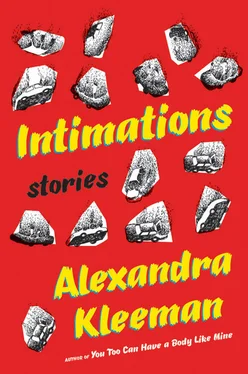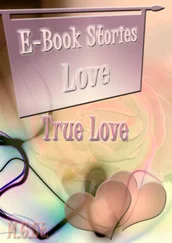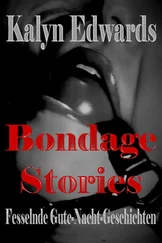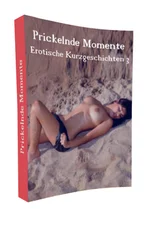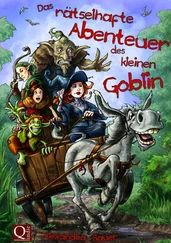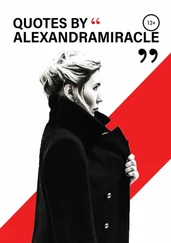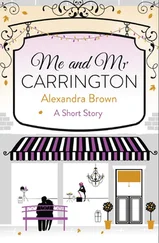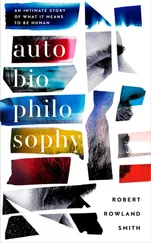I walked over to it, right out in the open, but nobody saw me. When I reached the base the controls were all locked up. It had a big goofy lever that you could set to different speeds, like in a cartoon. I ducked the chain and climbed into the ground-level car, the one in starting position, and staggered from one side of the car to the other to try to make it swing, but it wasn’t any fun. Then I sat facing the water and put down the guardrail. The lake licked at the shore the way it used to. When water disappears, other water rushes in right away to take its place, you never see any kind of hole or gap. Then when I reached into my plastic bag, I only had one apple.
This apocalypse disappears objects of all kinds, and it swallows memories whole too. I didn’t want to be around you when you forgot me. I didn’t want to watch it fall out of your head so easily, I was hoping to forget you first. But sometimes I second-guessed that. Then I called you and tried to be angry, as though you were the one who had been so afraid of being forgotten that you needed to move out of the apartment, out of the city, and into another city where nothing had any familiarity to start with, or any familiarity to lose. I thought you might have forgotten who did what to whom, but you haven’t yet.

When the first things began to disappear, it had looked funny, like a continuity slip-up in a bad movie. You and I would make sound effects for them, shouting “Poof!” or “Boink!” as some flowers blinked themselves out of existence. This was how we’d make each other laugh. In those days the world still looked full, even though it was emptying fast. Then too many things vanished to keep making the sounds: we saw it was sad that anything in the world had gone and could not return. You joked around, saying there’d be fewer chores, our lives would clean up after themselves for a change, but still you went on doing the dishes, vacuuming the little spaces around and under the furniture, putting on a fresh shirt every day, making the bed. You folded cups out of paper for us to drink from when the glasses went away, and when the paper went you used the nice cloth napkins, which worked badly. You were the sort of person that keeps it all going, and I was the other kind.
This became clear two weeks after the first vanishings, when the news stations named it “The Disappocalypse.” On the day they called it irreversible, I walked out of the office just before lunch. I didn’t tell anyone where I was going, I didn’t reply to the e-mails asking whether we wanted to cancel our health insurance and cash out retirement plans. I knew I wouldn’t be coming back. The subway was shut down so I walked all the way to our apartment on Myrtle Avenue, across the Brooklyn Bridge to the Flatbush Extension. On that day the world still felt crowded. The sky above was pure undiluted blue, thick enough to mask how much emptiness lay behind it, out past the atmosphere. Cars were lined up on the bridge, bumper to bumper. Drivers honked sporadically, without aggression, like migrating geese.
When I got home, it was late afternoon and you’d be back by six thirty. I tried reading the newspaper, but I’d read all I could stand about the vanishing, and the other sections had been thinning out, some with blank patches nobody bothered to fill where the color of the paper showed through grayish and soft. Then it was seven thirty, and eight, and still you weren’t around. I gave Cookie her dry food and refilled her water. I started crying and stopped again and then dragged eyeliner back over my lids so that I looked the way I had before. When you showed up, it was close to nine, and you smelled normal: no sweat, no cigarettes, no liquor. Where had you been? You had been working late. Hadn’t you heard?
They said “irreversible,” “imminent,” “end of days.” They used those words.
I put wet marks into your shirt as you held me. Then when I pulled away your chest looked back at me with two blurry eyes.
Why did you do that? I asked. Why were you away so long?
I was working, you said. A lot of people have left, you know that. Toby and Marianne and all of the interns. We’re understaffed. I’m on two new building projects. Your back was warm and real under my hands.
There’s nothing to build, I said. The world is going.
I know that, you replied. But there isn’t anything we can do about it.
That’s what I’m saying, I said.
I looked at you looking at me. I heard that we were saying the same thing, though I didn’t understand how it was possible for us to mean it so differently. Later that night I asked you to quit your job too, stay home with me during the days. We could get survival-ready, rent a garden-level apartment with barricadable windows. We could walk around all day getting to know the things that wouldn’t be there for much longer. But you wouldn’t. You liked being an architect. You said it would make you happy to have added even one thing to a world now headed for total subtraction.

The walking path next to the highway passed under a bridge. In the cool dark beneath was a bench facing onto some empty lot full of broken glass from bottles that people had thrown just because. When sunlight hit the broken pieces, the ground lit up like a reverse chandelier, a glittering patch of green and white. Now there was less each time I walked by. Also, no bench. I stood there facing the glass, eating my last apple.
There had been times when I thought I might be with you indefinitely, something approaching an entire life. But then when there was only a finite amount of time, a thing we could see the limit of, I wasn’t so sure. I didn’t know how to use a unit of time like this, too long for a game of chess or a movie but so much shorter than we had imagined. It felt like one of those days when we woke up too late for breakfast and lay in bed until it was too late for lunch. Those days made me nervous. On those days we fought about how to use our time. You didn’t want to live your life under pressure, as though we’d run out, as though it were the last days. I’m not ill, you said. We aren’t dying, we don’t have cancer, you said. So I don’t want to live like we do, you said. There are two kinds of people, and one of them will give up first.
When we fought, you got over it first. I’d watch you from the kitchen, through a rectangular space cut into the wall, and I could see you studying the newspaper, ducking your head down to read small details in the photographs. I saw how gracefully you fell back into whatever article you had been reading before. Even then I knew: whatever hollow I made in you if I left would heal up like a hole sunk into water, quick as water rushing to fill some passing wound.
This far from the pier I could still hear the seagulls fighting over scraps, crying out with their harsh voices. Sounds carried farther these days, tearing through the thin air like a stone thrown as hard as you can toward the sea. The bitten-down apple core wet my right-hand glove, while with the other hand I pressed on the bridge of my nose. There are two kinds of people: one will only weep when the possibility exists, however remote, that someone will hear them. I put the core of the apple down on the ground and looked at it. Poof, I said. I waited for something to happen. Then I went and walked back up the path toward the high-rise.
When I got home, I collected all of Cookie’s toys, her food bowl and water bowl, the little purple ball with a bell in it, the stuffed squeaking duck that was almost her size. I lined them all up on the mantel in the living room so that I could watch them disappear, one after the other.
Читать дальше
